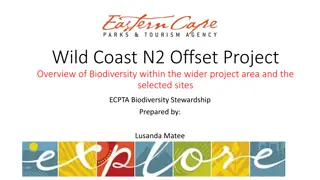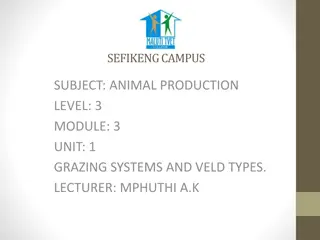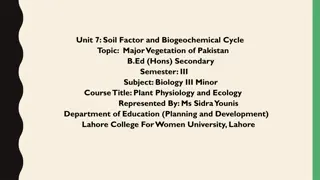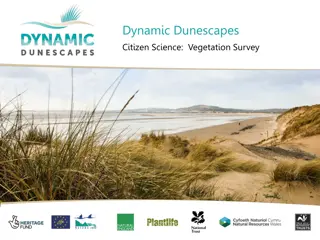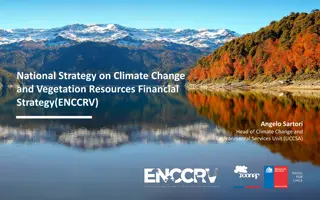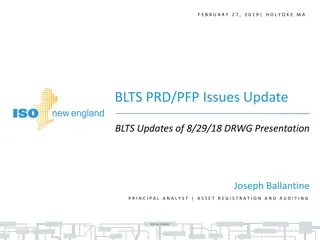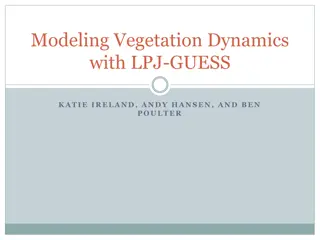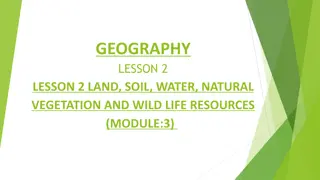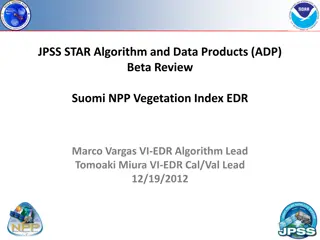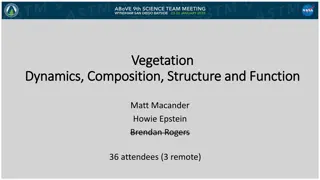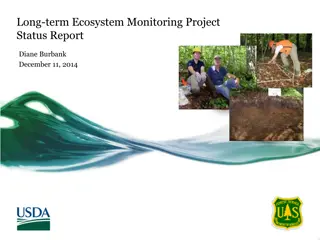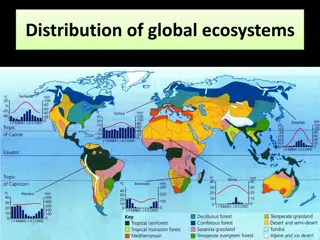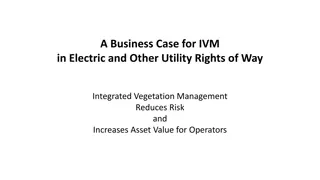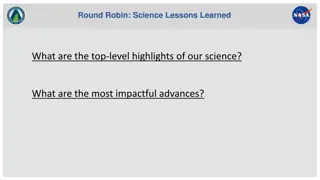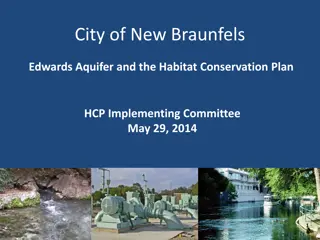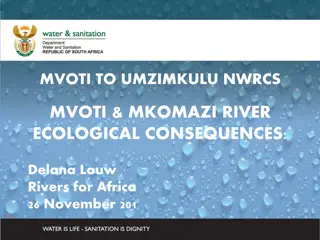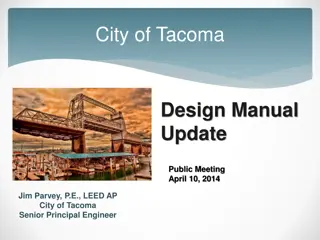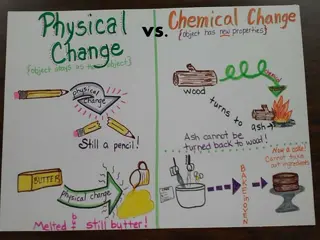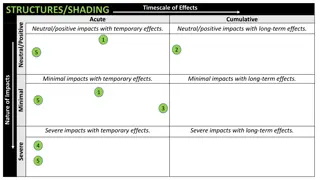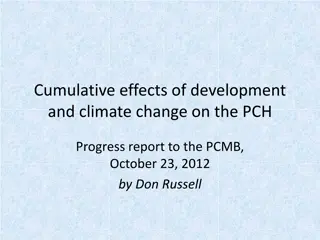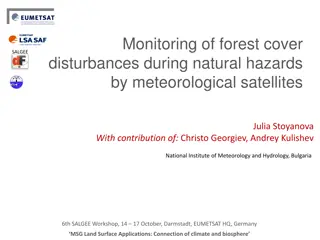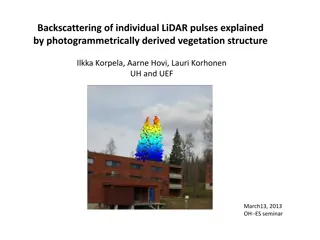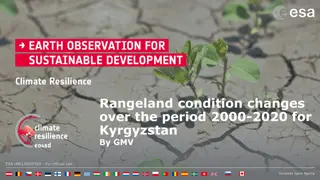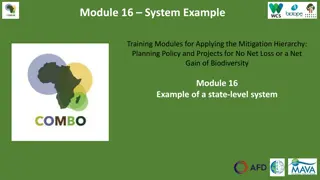Infectious Endocarditis
A 22-year-old female patient with a history of infected endocarditis and recent dental procedure presents with high-grade fever, chills, shortness of breath, and arthralgia. Examination reveals a pan systolic murmur and tachycardia. Echocardiography shows mitral regurgitation with vegetation on the
1 views • 32 slides
Pilottown Village Community Meeting on Potential Covenants Changes
The Pilottown Village Community is holding a meeting on February 3, 2024, to discuss potential changes to the Covenants. The meeting agenda includes topics like noise, clotheslines, signs, and more. A committee has been formed to review the Covenants and draft changes based on community feedback. A
1 views • 35 slides
CYGNSS Earth Venture Mission Overview
The CYGNSS Earth Venture Mission involves eight satellites in low Earth orbit designed to measure near-surface wind speed over oceans and map soil moisture and inland water under vegetation on land. Launched in December 2016, the mission has been successful, currently in its extended phase with seve
2 views • 9 slides
Understanding Hillslopes and Their Significance in Geomorphology
Hillslopes are angular inclinations of terrain between hilltops and valley bottoms, shaped by geological structures, climate, vegetation cover, and denudational processes. They are key geomorphic features in fluvial drainage basins, playing a crucial role in landscape formation and water/sediment tr
6 views • 22 slides
Embracing Sustainability: A Comprehensive Analysis of Carbon Neutral Farming
Carbon Neutral Farming Market, also known as carbon farming or climate-smart agriculture, focuses on reducing greenhouse gas emissions and sequestering carbon in soils and vegetation.
3 views • 2 slides
Wild Coast N2 Biodiversity Offset Project Overview
In 2014, SANRAL initiated the N2 Wild Coast Biodiversity Offset project to conserve biodiversity in selected sites along the Wild Coast region. The project aims to protect and promote the unique biodiversity of these areas without introducing new species or disrupting local communities. Through acti
0 views • 11 slides
Machetes
Gear up for your next adventure with Survival Supplies Australia's range of premium machetes. Find high-performance machete knives online for your next adventure.\n\nTop Brands & Styles\nBrowse our range of steel machetes, army machetes, and kukri knives. Our selection includes top brands like Cold
0 views • 1 slides
Machetes
Gear up for your next adventure with Survival Supplies Australia's range of premium machetes. Find high-performance machete knives online for your next adventure.\n\nTop Brands & Styles\nBrowse our range of steel machetes, army machetes, and kukri knives. Our selection includes top brands like Cold
0 views • 1 slides
Understanding Grazing Systems and Veld Types in Animal Production
This educational material covers various grazing systems, veld types, and the impact of different grazing animals on the vegetation. It discusses the importance of understanding veld types such as sweetveld, sourveld, and mixed-veld, and how factors like rainfall and soil texture influence these cla
0 views • 15 slides
Natural Vegetation and Wildlife Sanctuaries in India
The natural vegetation in India varies based on climatic and topographical factors, leading to diverse flora such as Evergreen Rain Forests, Monsoon Deciduous Forests, and Desert ecosystems. The Himalayas showcase vegetation changes with altitude, while factors like soil and topography influence veg
2 views • 39 slides
Major Vegetation of Pakistan - Overview and Characteristics
Vegetation in Pakistan varies from tropical forests to thorn forests, each with unique adaptations to the climate. Natural and local vegetation types like tropical dry deciduous forests and thorn forests are described, highlighting plant adaptations and environmental factors influencing growth.
0 views • 20 slides
Understanding Biomes: Climate, Vegetation, and Adaptations
Biomes are vast regions defined by climate, plant and animal communities. Factors like climate, geography, and vegetation impact the unique characteristics of each biome. Understanding biomes involves knowledge of climate, geography, vegetation adaptations, and animal diversity. Changes in one part
0 views • 23 slides
Understanding Sand Dune Vegetation: Citizen Science Survey
Conduct a vegetation survey to track changes in sand dune ecosystems over time. Monitor bare sand cover, vegetation types, plant species health indicators, and nutrient levels. Learn how to conduct the survey to help inform management decisions and preserve dune environments effectively.
0 views • 10 slides
Financial Strategy for National Strategy on Climate Change and Vegetation Resources
The Financial Strategy for the ENCCRV encompasses three phases - Preparation, Implementation, and Payment based on results, with a focus on addressing deforestation, forest degradation, and promoting sustainable vegetation management. Funding sources include international funds, private sector inves
0 views • 9 slides
Understanding Calorimetry and Enthalpy Changes in Chemistry
This content explores various concepts related to calorimetry, enthalpy changes, and Hess's Law in the field of chemistry. It covers topics such as energy released in combustion reactions, heat capacity, phase changes, and the application of Hess's Law in determining enthalpy changes. Enthalpy value
0 views • 17 slides
Release 3 Changes Overview for UK Link Implementation
This document outlines the upcoming Release 3 changes for the UK Link implementation scheduled for November 2018. It covers the purpose, impacts, and specific changes related to read submission, impacting Shippers and Daily Metered Service Providers. The document also details the list of all changes
0 views • 15 slides
Update on BLTS Changes Implementations
Participants were updated on three changes implemented in BLTS, identified in a larger set of proposed changes across multiple platforms. Changes were notified on 12/10/2018. Resolved issues and updates were discussed regarding flagging of zero load data and bad quality data within first baseline ca
0 views • 7 slides
Exploring Kamloops: Landforms, Climate, Vegetation, and Environmental Issues
Discover the diverse landscape of Kamloops with its mountains, lakes, and unique vegetation. Learn about the hot summers and cold winters, ideal for activities like golfing and snowshoeing. However, forest fires pose a significant environmental issue, impacting animals, humans, and habitats. Explore
0 views • 9 slides
VELCO Vegetation Management Plan Overview 2021
Detailed analysis of the proposed vegetation management plan by VELCO for 2021, including comparisons between planned and actual units, herbicide usage by chemical and line, Rodeo usage by year, scheduled maintenance areas, and ultra-low volume foliar treatments. The data visualizations provide insi
0 views • 12 slides
Understanding Vegetation Dynamics with LPJ-GUESS Modeling
Explore the modeling of vegetation dynamics using LPJ-GUESS, covering stand to global scale approaches, management needs, and ecosystem-scale considerations. Discover the characteristics of ecosystem-scale modeling and the inputs and outputs of LPJ-GUESS for simulating vegetation dynamics.
0 views • 14 slides
Understanding Natural Vegetation and Wildlife Resources
Natural vegetation and wildlife play a crucial role in the biosphere, providing essential resources and maintaining ecological balance. The interaction between the lithosphere, hydrosphere, and atmosphere creates the biosphere where living organisms thrive. Plants offer timber, oxygen, and other val
0 views • 16 slides
Understanding Significant Changes in IACUC-Approved Protocols
This presentation covers essential information on significant changes in IACUC-approved protocols, including defining significant changes, reviewing methods, implementing the Veterinary Verification and Consultation process, and examples of significant changes. It also discusses the impact on animal
2 views • 21 slides
Overview of Vegetation Index EDR Data Products and Team Members
This content discusses the JPSS STAR Algorithm and Data Products (ADP) Beta Review related to Vegetation Index EDR, including details on various data products, team members, beta maturity definition, and background of VI EDR product. It provides insights into the TOA-NDVI and TOC-EVI vegetation indi
0 views • 33 slides
Insights into Vegetation Dynamics and Function in Ecosystems
Explore the complexities of vegetation dynamics, composition, structure, and function in various ecosystems through discussions on disturbance, wetlands, hydrology, and ecosystem services. Engage in ongoing dialogues about vegetation classification schemas and practical methods like traits mapping t
0 views • 9 slides
Long-term Ecosystem Monitoring Project Status Report
The Long-term Ecosystem Monitoring Project, led by Diane Burbank, provides an overview of a 50-year monitoring effort focusing on the effects of broad-scale environmental changes. The project involves sampling soil, vegetation, lichen, and down woody material at 20 plots every 10 years. Site selecti
0 views • 12 slides
Understanding Global Ecosystems and Climate Influences
Global ecosystems are defined by dominant vegetation types and are influenced by factors like climate, atmospheric circulation, altitude, relief, and ocean currents. The distribution and characteristics of ecosystems are shaped by global atmospheric circulation patterns, creating distinct belts of v
0 views • 18 slides
Enhancing Utility Rights of Way with Integrated Vegetation Management
Integrated Vegetation Management (IVM) is a systematic approach that promotes low-growing plant communities to resist invasive tree species. It involves continual improvement through a cycle of information gathering, planning, implementation, and review. By employing IVM in utility rights-of-ways, o
0 views • 21 slides
Insights from Round Robin Science Lessons Learned
Discover the latest advances in science including insights on the arctic carbon budget, disturbance quantification, vegetation changes, permafrost modeling, and remote sensing processing workflows. Dive into the complexities of carbon mapping, water dynamics, vegetation responses, and trait algorith
0 views • 8 slides
PEIA Open Enrollment Plan Year 2023 - Important Updates
PEIA Open Enrollment for the Plan Year 2023 is scheduled from April 2 to May 15. Changes made during this period will be effective from July 1. Benefit Coordinators must approve any changes by May 20. Members can make changes by visiting the PEIA website, calling the helpline, or filling out forms o
0 views • 36 slides
Conservation Plan for Aquatic Habitat Restoration in New Braunfels
This plan outlines various projects aimed at managing aquatic habitats in New Braunfels for the restoration and preservation of native species such as the fountain darter. It includes objectives like flow manipulation, non-native vegetation control, and restoration of aquatic vegetation in the Comal
0 views • 17 slides
Ecological Consequences Assessment for Conservation Areas
Determining the ecological consequences of various scenarios is crucial for conservation efforts. The assessment focuses on changes in geomorphology, physico-chemical properties, fish populations, macroinvertebrates, and riparian vegetation. By evaluating scenarios based on ecological significance,
0 views • 11 slides
City of Tacoma Design Manual Update Meeting Overview
Updates to the City of Tacoma Design Manual were discussed in a public meeting in April 2014. The manual, last updated in 2004, needed revisions due to changes in surface water regulations. The focus was on making Low Impact Development (LID) the preferred approach for site development, aiming to mi
0 views • 11 slides
Understanding Physical and Chemical Changes in Science Class
Explore the concepts of physical changes and chemical reactions in this interactive science lesson. Students will differentiate between the two types of changes, identify evidence for each, categorize examples, and discuss key concepts with their peers at the table. Through videos and discussions, t
0 views • 21 slides
Anchorage Alcohol Code Update: Tax Administration Changes (Part 3)
Anchorage is undergoing updates to its alcohol code, particularly focusing on tax administration changes. The municipality is aiming to implement these changes by December 2023, with a targeted local policy adjustment in 2024. The proposed exemptions aim to reduce administrative burdens on permit ho
0 views • 9 slides
Marine Aquaculture Impacts on Submersed Aquatic Vegetation
The document explores the impacts of structures and shading used in commercial shellfish mariculture activities on submersed aquatic vegetation, particularly seagrasses. It discusses the varying effects of mariculture structures on eelgrass density, productivity, and the potential habitat they provi
0 views • 11 slides
Cumulative Effects of Development and Climate Change on Caribou Population
This progress report by Don Russell on the cumulative effects of development and climate change on the Porcupine Caribou Herd (PCH) discusses findings related to climate analysis, winter range selection behavior, modeling the impacts of climate change and development on caribou body size, energy-pro
0 views • 9 slides
Monitoring Forest Cover Disturbances During Natural Hazards by Meteorological Satellites
Ecosystem functioning relies on energy, water, and carbon fluxes regulated by vegetation and soil properties. This study focuses on monitoring forest cover disturbances before, during, and after natural hazards using meteorological satellites. It involves analyzing land surface temperature, evapotra
0 views • 37 slides
Understanding LiDAR Backscattering and Vegetation Structure Analysis
Exploring the intricacies of LiDAR pulse backscattering in relation to vegetation structure analysis using photogrammetry-derived data. Discussing the technical aspects of pulsed LiDAR sensors, hot-spot view geometry, time-stamped photons, vicarious reflectance calibration, and challenges in radiome
1 views • 19 slides
Rangeland Condition Changes in Kyrgyzstan 2000-2020 Analysis
Detailed analysis of rangeland condition changes in Kyrgyzstan from 2000 to 2020 utilizing remote sensing data and local information. Focus on impact assessment, climate resilience, and poverty reduction. Data processing involved calculation of various vegetation indices and degradation assessment f
0 views • 16 slides
Biodiversity Mitigation in Victoria, Australia: A Case Study
Exploring the biodiversity offsetting system in Victoria, Australia, this case study focuses on the state's efforts to achieve Biodiversity Net Gain. The modules cover topics such as ecological vegetation classes, habitat condition scores, offset implementation, and the evolution of offsetting pract
0 views • 41 slides





